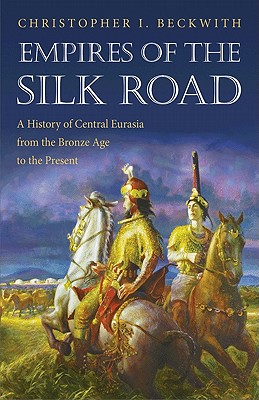

 Princeton University Press
Princeton University Press
Empires of the Silk Road: A History of Central Eurasia from the Bronze Age to the Present


Key Metrics
- Christopher I Beckwith
- Princeton University Press
- Paperback
- 9780691150345
- 8.47 X 5.48 X 1.41 inches
- 1.1 pounds
- History > Asia - Central Asia
- English
 Secure Transaction
Secure TransactionBook Description
The first complete history of Central Eurasia from ancient times to the present day, Empires of the Silk Road represents a fundamental rethinking of the origins, history, and significance of this major world region. Christopher Beckwith describes the rise and fall of the great Central Eurasian empires, including those of the Scythians, Attila the Hun, the Turks and Tibetans, and Genghis Khan and the Mongols. In addition, he explains why the heartland of Central Eurasia led the world economically, scientifically, and artistically for many centuries despite invasions by Persians, Greeks, Arabs, Chinese, and others. In retelling the story of the Old World from the perspective of Central Eurasia, Beckwith provides a new understanding of the internal and external dynamics of the Central Eurasian states and shows how their people repeatedly revolutionized Eurasian civilization.
Beckwith recounts the Indo-Europeans' migration out of Central Eurasia, their mixture with local peoples, and the resulting development of the Graeco-Roman, Persian, Indian, and Chinese civilizations; he details the basis for the thriving economy of premodern Central Eurasia, the economy's disintegration following the region's partition by the Chinese and Russians in the eighteenth and nineteenth centuries, and the damaging of Central Eurasian culture by Modernism; and he discusses the significance for world history of the partial reemergence of Central Eurasian nations after the collapse of the Soviet Union.
Empires of the Silk Road places Central Eurasia within a world historical framework and demonstrates why the region is central to understanding the history of civilization.
Author Bio
Professor Beckwith has taught at Indiana University for 41 years, in which time he has developed 48 distinct courses. He is one of the most prolific and versatile researchers in the field of Central Eurasian studies.
Beckwith is renowned for revolutionary scholarship that reshapes understanding of how, why and when the Central Eurasian steppe peoples from Eastern Europe to East Asia influenced the development of knowledge, religious beliefs and societies, not only within their homeland but in the neighboring peripheral cultures of Europe, the Middle East, South Asia, and East Asia as well.
His research focuses on the history of ancient and medieval Central Asia and the cultures of those peripheral peoples, as well as the linguistics of Aramaic, Chinese, Japanese, Koguryo, Old Tibetan, Tokharian, Old Turkic, Uzbek, and other languages.
He has been named a MacArthur Fellow, a Guggenheim Fellow, a Fulbright-Hays Fellow, and a Japan Foundation fellow and has had numerous visiting appointments around the United States and the world. He has authored 10 books and 49 articles.
Source: Indiana University Bloomington
Videos
No Videos
Community reviews
Write a ReviewNo Community reviews